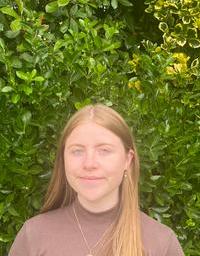Meet Vacation Studentships recipient: Jane Pocock

1. What is your name and institution?
Jane Pocock, UCD School of Biomolecular & Biomedical Science, Conway Institute, University College Dublin
2. Please can you tell us why you applied for the Harry Smith Vacation studentship?
Analysing recent publications during my university coursework made me consider research as a career, and the impact it makes on patients’ lives sparked my interest in Infection Biology. As a Barretstown volunteer working with children with serious illnesses, I understand the toll that cystic fibrosis (CF) and associated chronic infections take on a family’s life. This was reinforced by Professor McClean’s lecture on Burkholderia cenocepacia chronic infection adaptations. Since undergraduates don’t get enough independent laboratory work, I knew engaging in research alongside a team of scientists, would boost my prospects as a future researcher and elevate my practical laboratory skills.
3. How did you feel when you found out your application was successful?
Finding out that my application was successful, I was excited to receive the opportunity to gain first-hand experience researching a topic I was fascinated by. It came as an immediate boost to my confidence and I felt invigorated to put my full focus into the studentship, hoping to contribute to publications and further research. With the support of the grant, I felt equipped to step out from the comfort of scheduled lectures and laboratory sessions and gain a clear insight into the daily life of the dedicated researchers and their laboratory work conducted to publish the papers I read.
4. How would you go-about explaining your research to someone who may not understand science?
I am interested in how bacteria change during prolonged infections, avoid our immune system and survive antibiotic treatment. Burkholderia species infect people with weakened immune systems, such as people with CF, while not harming healthy individuals. I showed that long-term low oxygen exposure, common in CF lungs, can trigger changes which allow Burkholderia to better survive through prolonged infection. These changes include producing more protein-degrading enzymes, uptaking less iron from their surroundings and surviving low pH and high salt concentrations. This knowledge can be further used to improve treatments for people with CF, tackling the urgent issue of antibiotic resistance.
5. What have you learnt from your experience?
This experience allowed me to learn and strengthen both laboratory techniques and soft skills, such as time management and efficient communication with a diverse team. I learnt to statistically analyse and efficiently visualise diverse data with advanced software and by reporting my findings at intradisciplinary lab meetings, I learnt to benefit from constructive criticism. A highlight of my experience was learning that even unexpected results can be used by clinicians to improve patient care. I will use these newly acquired skills through my final year research project and my future career in research or industry.
6. How do you think this vacation will help your career progression?
This award encouraged me to carefully consider my next career steps, as I now have a clearer understanding of the daily routines and the commitment and dedication of researchers. Having the opportunity to be self-sufficient showed me that I am capable of planning my work to successfully complete my fourth-year project and work towards a PhD. I now have an insight into what I can achieve, and I have built valuable connections with the members of the lab who provided advice on achieving my career goals. By expanding my multi-disciplinary skills, my chances of future employment are now elevated.
7. Why is support, such as this grant provided by the Microbiology Society, so important?
Grants such as this are extremely beneficial to undergraduate students as they enable us to reach our full potential, receiving comprehensive training from experts in the field. Inspiring a generation of young scientists is vital to create a strong future research force and in-person experience is imperative. Importantly, receiving financial support allows undergraduates to fully dedicate their focus to the project, promoting inclusion, creating a space where everyone is encouraged to make an impact. Through the research we perform we benefit society, as it has the potential to improve the health and quality of life of individuals with life-threatening illnesses.
Having the opportunity to be self-sufficient showed me that I am capable of planning my work to successfully complete my fourth-year project and work towards a PhD. I now have an insight into what I can achieve, and I have built valuable connections with the members of the lab who provided advice on achieving my career goals.
